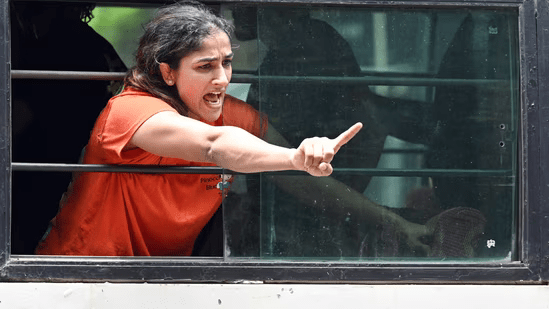The question to ask five months after India’s most celebrated wrestlers began their unprecedented protest is: What does it take to ensure justice for women?

What does it take to ensure justice for women?(Hindustan Times)
Perhaps the question to ask now, five months after India’s most celebrated wrestlers began their unprecedented protest against Wrestling India Federation head Brij Bhushan Sharan Singh, is this: What does it take to ensure justice for women?
Let’s be clear, justice for the wrestlers, if it comes at all, is still a long way off. Brij Bhushan, a six-time Bharatiya Janata Party member of Parliament from Kaiserganj, Uttar Pradesh, accused of sexual harassment, has demonstrated extraordinary staying power. A six-hour long meeting between the wrestlers and sports minister Anurag Thakur has reportedly yielded only the promise of a charge-sheet against Singh, an internal complaints committee (mandated by law anyway) to be headed by a woman, the withdrawal of police complaints against the wrestlers, and an assurance that Singh will not be replaced, if it comes to that, by a proxy member of his own family.
To reach even this tenuous place of possibility, the athletes have had to seek Supreme Court intervention for something as basic as registering a police complaint. They’ve had to sit in public protest. They’ve been manhandled by the police, a move that even the most die-hard BJP sympathisers concede is “bad optics”. They’ve been subjected to a misinformation campaign on social media, including the doctoring of their photographs. They’ve had to threaten to submerge their medals in the Ganga. The meeting with Thakur comes only after intervention by the powerful farmer lobby.
If this is what justice for India’s most successful athletes looks like, what does it look like for the ordinary woman or girl? This doesn’t make for pleasant reading but please read just a short account from the website Article-14. In December 2021, a minor Dalit girl in UP’s Unnao district complained to the police that she had been raped by five men. The police did nothing. Then the same men raped her again in February 2022. Again, the police did nothing. In September, the girl delivered a child. Nothing. In April this year, angered by the refusal of the girl and her father to “compromise” and stay silent about the crime, one of the men set her house on fire. In that blaze, the girl’s now six-month-old baby and three-year-old sister sustained grievous injuries. Finally, after a court order, the police has registered a complaint.
What protects the alleged rapists in Unnao is not some political godfather but a system that from the time of the infamous Mathura rape case in the 1970s does not believe women. The system did not believe that Mathura, a tribal girl from Maharashtra, could have been raped because, the judge said, she was “habituated to sex”. It’s the same system that through the MeToo movement of 2018, asked: Why is she speaking up now? And it’s the same system that leads so many to question the motives of the wrestlers.
In this system, speaking up seems to be worse than the crime itself. In 2018 we saw it when then minister of state M.J. Akbar filed a defamation case against Priya Ramani. In a karmic twist, he lost.
Less than five years later, the wrestlers in sports most significant MeToo movement have everything to lose. They are at the prime of their careers and ought to have been focusing on the Paris Olympics. What could they possibly gain except wanting things to be better for a new generation? As Vinesh Phogat said to me: “We had to suffer in silence. But these girls should not have to.”
Make no mistake, it is the system that is under attack. If we are to question what makes Brij Bhushan Sharan Singh qualified to head a professional wrestling body, then the natural corollary would be to question the heads of all sporting federations that are packed with political appointees. A logical probe would be into the sense of entitlement over the bodies and fates of young women whose only desire is to assert themselves and be heard.
At the heart of this protest is the unanswered question, what does it take to bring down patriarchy? It’s a question nobody really wants to answer.
Namita Bhandare writes on gender. The views expressed are personal.